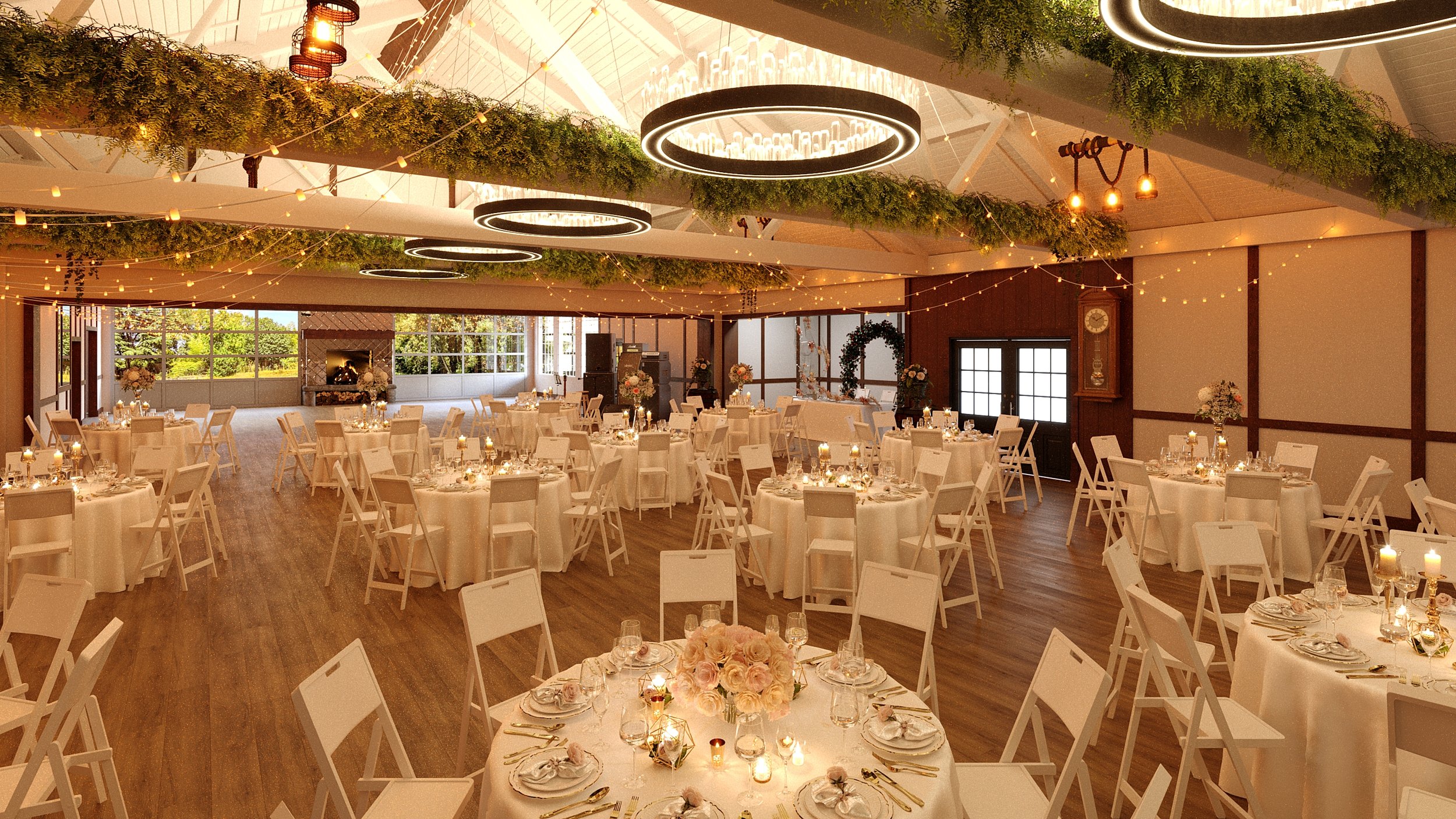Indoor vs. Outdoor Wedding Spaces: Weighing the Pros and Cons for Your Big Day
When it comes to planning a wedding, one of the most significant decisions a couple must make is choosing between an indoor or outdoor wedding venue. Both options offer unique advantages and challenges, and the choice will ultimately depend on your personal preferences, the season, and the specific vision you have for your big day. In this blog, we’ll explore the pros and cons of indoor versus outdoor wedding spaces, helping you make an informed decision for your wedding. We'll also touch on some considerations specific to Connecticut weddings, a state known for its picturesque landscapes and charming venues.
The Appeal of Outdoor Wedding Spaces
Outdoor weddings have become increasingly popular, especially as couples look for unique, natural settings to celebrate their union. There’s something undeniably romantic about saying “I do” under the open sky, surrounded by nature. However, outdoor weddings come with their own set of advantages and potential drawbacks.
Pros of Outdoor Wedding Spaces
Scenic Beauty and Natural Decor: One of the most significant advantages of an outdoor wedding is being surrounded by nature. Whether you’re in a garden, by the beach, or on a mountaintop, the landscape itself becomes part of your wedding decor. In Connecticut, venues like parks, vineyards, garden venues and waterfront locations provide stunning backdrops that require minimal additional decoration.
Open-Air Experience: Outdoor weddings offer a sense of freedom and space that indoor venues can’t match. The open-air environment can make the event feel more relaxed and less formal, which is perfect for couples who want a laid-back celebration. Guests can mingle freely, and there’s often more room for activities like lawn games or outdoor dining.
Natural Lighting: The natural lighting at an outdoor wedding can be a photographer’s dream. The golden hour, just before sunset, provides soft, flattering light that can make your wedding photos look magical. This lighting can’t be replicated indoors, making outdoor weddings particularly appealing for those who want stunning photography.
Variety of Settings: The variety of outdoor settings is virtually limitless. From rustic barns to elegant gardens to beachfront ceremonies, outdoor venues can be tailored to fit any wedding theme. Connecticut, with its diverse landscapes, offers everything from coastal venues along Long Island Sound to countryside settings in the Litchfield Hills.
Cons of Outdoor Wedding Spaces
Weather Uncertainty: The most significant drawback of an outdoor wedding is the unpredictability of the weather. Rain, wind, or extreme heat can all impact your big day, potentially forcing last-minute changes to your plans. Even in Connecticut, where the weather is generally mild, spring showers or unexpected storms can be a concern.
Logistical Challenges: Outdoor venues often require more logistical planning. You’ll need to consider everything from seating and tents to portable restrooms and generators. In some cases, you may also need to obtain permits for the use of public spaces. These additional considerations can add complexity to your wedding planning.
Accessibility Concerns: Depending on the location, outdoor venues may present accessibility challenges for some guests. Uneven terrain, long walks to the ceremony site, or a lack of nearby parking can make it difficult for elderly guests or those with mobility issues to fully enjoy the event.
Limited Seasons: In New England, outdoor weddings are often limited to the late spring, summer, and early fall months due to the climate. Winter weddings are typically not feasible outdoors, and even in the warmer months, the weather can be unpredictable.
The Comfort of Indoor Wedding Spaces
Indoor wedding venues offer a controlled environment that can be customized to suit your style and preferences. Whether you’re envisioning a grand ballroom, a cozy lodge venue, or a modern banquet hall, indoor spaces provide a level of comfort and reliability that outdoor venues may lack.
Pros of Indoor Wedding Spaces
Weather Control: One of the most significant advantages of an indoor wedding is the ability to control the environment. Rain, snow, or heatwaves won’t interfere with your plans, allowing you to relax and enjoy your day without worrying about the weather. This is particularly appealing in Connecticut, where the weather can be unpredictable.
All-Season Availability: Indoor venues are available year-round, making them ideal for winter weddings or events planned during seasons when outdoor options might be limited. Whether you’re planning a cozy winter wedding with a roaring fire or a summer event with air conditioning, indoor venues offer flexibility.
Ease of Customization: Indoor venues provide a blank canvas that you can decorate to suit your wedding theme. From lighting to floral arrangements to table settings, you have complete control over the look and feel of your event. Many indoor venues also offer in-house decor options and coordinators who can help bring your vision to life.
Comfort and Amenities: Indoor spaces often come equipped with amenities that can enhance the comfort of your guests, such as climate control, restrooms, and accessible facilities. You’ll also have access to on-site kitchens, bridal suites, and other conveniences that can make your day run smoothly.
Cons of Indoor Wedding Spaces
Limited Space and Views: While indoor venues can be beautifully decorated, they lack the expansive views and natural surroundings of outdoor settings. If you’re dreaming of a wedding with sweeping landscapes or a connection to nature, an indoor venue might not provide the ambiance you’re looking for.
Potentially Higher Costs: Indoor venues, particularly those that offer full-service packages, can be more expensive than outdoor spaces. The cost of renting a grand ballroom or historic mansion, along with catering, decor, and other services, can add up quickly. It’s essential to factor these costs into your budget.
Restrictions on Decor and Activities: Some indoor venues have restrictions on decor or activities to protect the space. For example, you might not be able to use open flames, hang decorations from the ceiling, or bring in outside vendors. These restrictions can limit your creative freedom and impact your overall vision.
Less Natural Lighting: Indoor venues often rely on artificial lighting, which can be less flattering in photos than natural light. While professional photographers can work with any lighting conditions, you may need to invest in additional lighting setups to achieve the desired look for your event.
Connecticut Considerations: Indoor vs. Outdoor Wedding Venues
When planning a wedding in Connecticut, it’s essential to consider the local climate and landscape when choosing between an indoor or outdoor venue. Connecticut’s weather is characterized by four distinct seasons, each with its own pros and cons for weddings.
Spring and Summer Weddings: Spring and summer are popular times for outdoor weddings in Connecticut, thanks to the pleasant weather and blooming landscapes. However, spring can bring unpredictable rain showers, so having a backup plan, such as a tent or an indoor space, is crucial. Summer weddings benefit from longer daylight hours, but the heat and humidity can be challenging for both guests and vendors.
Fall Weddings: Fall is a particularly stunning time for outdoor weddings in Connecticut, with the vibrant foliage providing a breathtaking backdrop. The cooler temperatures and crisp air make it a comfortable season for guests. However, as the season progresses, the weather can become unpredictable, and the days grow shorter, which might necessitate additional lighting for evening events.
Winter Weddings: Winter in Connecticut is cold, with snow a common occurrence. While outdoor winter weddings are rare, indoor venues offer a cozy and romantic setting. An indoor wedding in a lodge or historic mansion can evoke a warm, intimate atmosphere, with fireplaces and winter decor adding to the charm.
Making the Decision: Indoor or Outdoor?
Ultimately, the decision between an indoor or outdoor wedding venue depends on your personal preferences, budget, and the season in which you’re getting married. Here are a few questions to ask yourself as you weigh the pros and cons:
What is your vision for the day? If you’ve always dreamed of a wedding surrounded by nature, an outdoor venue might be the best choice. If you prefer a more controlled environment with customizable decor, an indoor venue could be a better fit.
How important is the weather to you? If the thought of rain or extreme temperatures stresses you out, an indoor venue offers peace of mind. If you’re willing to take the risk for a stunning outdoor backdrop, be sure to have a solid contingency plan in place.
What is your budget? Outdoor weddings can be less expensive but may require additional rentals and logistical planning. Indoor weddings can offer more all-inclusive packages, but at a higher cost.
Who are your guests? Consider the comfort and accessibility of your guests. If you have elderly or mobility-impaired guests, an indoor venue with accessible facilities might be more accommodating.
A Connecticut Venue That Offers Both: The Hops Company
For couples who can’t decide between an indoor and outdoor venue, The Hops Company in Connecticut offers the best of both worlds. The Garden at The Hops provides a beautiful outdoor space surrounded by lush greenery, perfect for a picturesque garden wedding. Meanwhile, The Lodge at The Hops offers a charming indoor space with rustic modern decor, ideal for a cozy and elegant celebration, regardless of the weather.
Whether you’re looking for the natural beauty of an outdoor setting or the comfort and convenience of an indoor venue, The Hops Company has something to suit every couple’s needs. With a blend of indoor and outdoor spaces, you can enjoy the flexibility to create your dream wedding in any season.
Choosing between an indoor and outdoor wedding venue is one of the most important decisions you’ll make as you plan your big day. Both options have their unique advantages and challenges, and the right choice will depend on your personal preferences, budget, and the season. By carefully considering the pros and cons, you can create a wedding that reflects your style and preference.


